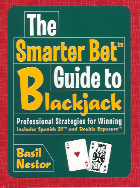
Smarter Bet Guide to Blackjack
Splitting in Blackjack: The Do’s and Don'ts for Every Hand
Blackjack is a game with arguably one of the lowest house edges among all other casino games, but only if you play it the right way. But what is the right way exactly?
Well, Blackjack is a game of There are occasions when we here at ReadyBetGo want to bring you interesting facts about the gambling industry When something catches our eye, we will publish it for your enjoyment.
There are occasions when we here at ReadyBetGo want to bring you interesting facts about the gambling industry When something catches our eye, we will publish it for your enjoyment. 
21 meaning that you play against the dealer who gets the closest hand to 21 is the winner. So, each hand can be calculated for probability.
In other words, you can calculate the probability of a certain card coming up, which will give you an idea about your next move whether to hit, split, hold, or double down.
When it comes to splitting in blackjack, not many people know when it is the best scenario for such a move. That’s why we’ve decided to give you some tips on when to split your cards in Blackjack just so you get the best chance of beating the dealer.
What Does Splitting Mean in Blackjack?
If you are just starting with Blackjack and wondering what splitting cards means, don’t worry is quite simple.
Splitting happens when you’re dealt a pair of cards with the same value. Then you get a chance to split them into two separate hands instead of playing them as one hand. This then allows you to place an additional bet equal to your original stake and each hand is played independently.
In other words, you can eventually split your cards three or four times and get a massive win beating the dealer in every hand.
Sounds great, right? However, you have to be careful when splitting cards just because the cards won’t go always in your favor. When it comes to blackjack, we are talking about a game that is all about calculating the odds and choosing the perfect timing.
So, when to split in blackjack?
The Do’s of Splitting in Blackjack
Let’s talk about the hands where splitting can give you the upper edge. These are your best opportunities to turn one good hand into two great ones.
1. Always Split Aces
Splitting aces is like discovering the cheat code of blackjack. Aces are the strongest card in the game and splitting them gives you two chances to build powerful hands.
Why it works: Each split ace gives you the potential to land a 10-value card, creating that magical 21.
Pro Tip: Some casinos limit you to one card per split ace. Even then, it’s usually worth it.
2. Always Split 8s
If you’re dealt a pair of 8s, splitting is almost always the right move. Why? Together, they form 16, one of the worst totals in blackjack. Separating them gives you two shots at improving your hands.
Why it works: Splitting 8s helps you avoid busting and increases your chances of landing better hands against the dealer.
3. Split 9s Against Weak Dealer Cards
Got a pair of 9s? Splitting can be a smart move if the dealer shows a weak card (2 through 6). However, if the dealer has a 7, 10, or ace, it’s better to keep your 18 and stand.
Why it works: Splitting 9s against a weak dealer card puts you in a strong position to build two winning hands.
The Don’ts of Splitting in Blackjack
Not every pair is made for splitting. Here are the hands you should keep together to avoid costly mistakes:
1. Never Split 10s or Face Cards
A pair of 10s equals 20, which is already an incredibly strong hand. Splitting them is essentially gambling away a near-certain win.
Why it doesn’t work: Splitting 10s often results in two weaker hands and significantly lowers your chances of beating the dealer.
2. Never Split 5s
A pair of 5s gives you 10, an excellent starting point for hitting toward a strong hand. Splitting them is a rookie mistake that can lead to disastrous results.
Why it doesn’t work: Keeping your 5s together allows you to double down and aim for a strong total. Splitting will leave you with two weak hands.
3. Avoid Splitting 4s
A pair of 4s gives you 8, a hand with the potential to grow. Splitting them usually results in two hands that struggle to reach a competitive total.
Why it doesn’t work: Splitting 4s rarely improves your odds and can leave you at a disadvantage.
Splitting in Different Situations
The rules for splitting can change depending on the dealer’s up card, the number of decks in play, and even the table rules. Let’s cover some common scenarios:
When the Dealer Has a Weak Card
If the dealer shows a 2 through 6, they’re in trouble. This is the time to be aggressive with your splits, especially with pairs of 7s, 9s, or even 6s.
When the Dealer Has a Strong Card
If the dealer shows a 9, 10, or ace, proceed with caution. Avoid risky splits like 6s or 7s and focus on preserving strong hands like a pair of 10s or face cards.
When Playing Single Deck Blackjack
In single-deck blackjack, every card dealt significantly impacts the odds. Be extra strategic with your splits and consider the count before making a move.
Common Mistakes to Avoid
Even seasoned players can fall into traps when it comes to splitting. Here are some common mistakes to steer clear of:
- Forgetting the Rules: Some casinos have restrictions on splitting aces or resplitting pairs. Know the house rules before you play.
- Ignoring the Dealer’s Card: Your decision to split should always consider the dealer’s up card. A strong dealer card can turn a good split into a bad move.
- Getting Greedy: Splitting is tempting, but it’s not always the best choice. Sometimes, holding a solid hand is smarter than risking two weaker ones.
Hopefully these tips will improve your winning chances. Remember, the cards won’t go in your favor every time, but your job is to take calculated risks, or risks where you get the best chance of winning.
